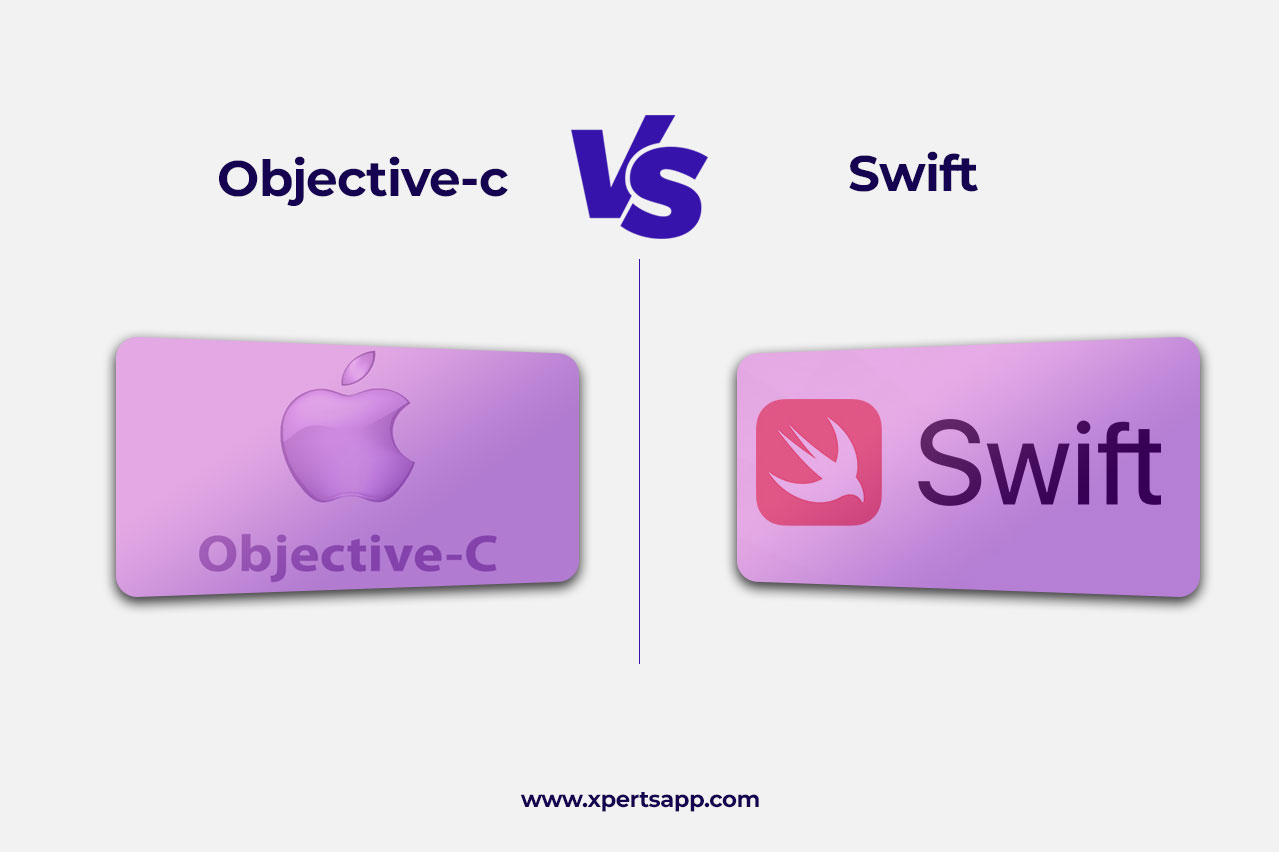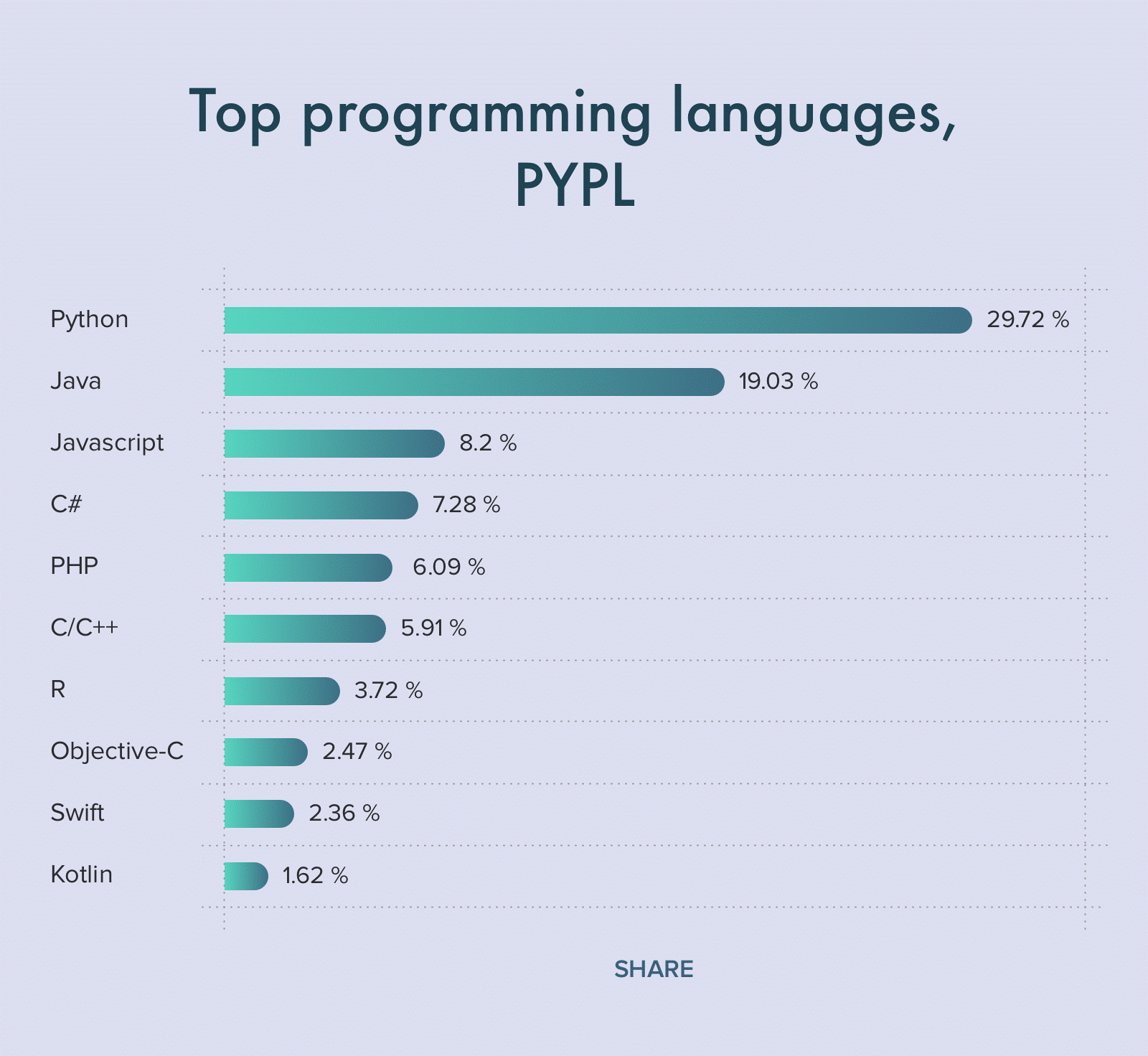Objective-c vs Swift: The Battle for Suitable iOS App Development In 2022
by: XpertsApp Team
-7328 views

Apple is the ever-growing emerging market known for its impeccable products and outstanding iOS features in the mobile-using world. With over 1 billion iPhones currently being operated by entity users worldwide, it goes without saying that the world awaits their products for months and buys them all as soon as they are on the rack. The reason behind its popularity is apparent. An all-purpose smartphone, they have the best and most enchanting features one can ask for. If you are a constant iPhone user, you must take a precise moment and think about those who create unique and valuable apps and the apt that iPhone has. But did you know that the hands that bear these apps are the hands that dwell with the nightmare of choosing between objective-c v/s Swift?
Here is what the stats had a say on it.
Most Popular Programming Languages in 2022
According to the statistics and data, here is the list of the most in-demand programming languages in 2022:

Objective-c vs Swift: The Basics of iOS Programming Language
Suppose you are looking to build an iOS application or are interested in knowing which is better. In that case, you must know what are the best-suited programming languages for creating an iOS mobile application.
To develop a native mobile application for iOS, you have to choose between two choices: It’s either an old buddy for iOS, Objective-C, or Swift, a new code lingo in the iOS town.
What is Objective-c?
Created by Brad Cox and Tom Love in the 1980s at stepstone and officially acquired by Apple in 1996, the Objective-C programming language is an object-oriented programming language used to develop various apps and software, especially those which include iOS and OS X. Objective C is a general-purpose language which is considered as a superset of C language which was designed to provide object-oriented capabilities.
In other words, objective-c has the power to dynamically capsule code. It means you can use it to create both lightweight and minor programs and large, complex programs, all while using the same coding manual.
Benefits of Objective-C Programming Language
- Long Running and Well-tested language iOS Programming Language.
- Stable performance.
- Easy to connect with APIs.
- Compatible with Java and C++.
- More stable, and the usage of private APIs is easier.
Although objective c is one of the oldest and most compatible programming languages ever built for iOS and has enjoyed its share of heirs for quite a long, the reign of objective-c is now over with swift taking s smooth ride over the market. People in the tech world believe that modern problems require modern solutions. Swift has appeared to be the problem solver in the modern programming world. Its popularity among the iOS and OS X programming languages is increasing nowadays. So much so that it has appeared to be the alternative to the well-known Objective-C.
But before we dive right into the details, let’s look at the basics of this new programming language that has swiftly entered the world of iOS programmers.
What is Swift?
Swift is a multi-paradigm, open-source programming language with outstanding features to read and write quickly. Apple itself created it in 2014 as a general-purpose and high-level programming language, mainly concerned with safety and performance.
Swift is influenced by objective c and aims to remain on top of the race for as long as possible until something better comes up. Well, let’s drop it for the future. Swift was designed explicitly to build iOS, Mac, Apple TV, and Apple Watch apps. The Swift language is constantly growing and has rapidly evolved in the community.
For starters, Swift was intended to be a replacement for C-based languages. If you are convinced that objective-c is the past and Swift is the future, well, you need to hold that thought. It’s a little early to make that decision.
Benefits of Swift Programming Language
- It is officially the first language created by the developers of Apple.
- Easy for new programmers to learn and code.
- Easy syntax and takes less time to develop.
- Faster and much safer.
- Largely adaptable iOS programming language.
Difference Between Objective-c and Swift
| Objective-C is an old programming language created in 1984 by Brad Cox and Tom Love as a superset of the C programming language. | In 2014, Apple announced the release of Swift years after acquiring objective-c. It was designed as an easy-to-learn and easy-to-use programming language. |
| Two programming languages were brought together to create Objective-C: Smalltalk and C. | It was heavily influenced by objective-c |
| It’s a language with complicated and tedious syntax and semantics. | It has an outstanding syntax that makes you write clear and consistent code. |
| It was designed for Smalltalk messaging. | It was designed to build apps for iOS, Phones, Pads, Macs, Apple TV, and Apple Watch.
|
| It lacks templates more than Swift. | Swift has multiple exciting templates. |
| Objective-C is 2.6 times slower than Swift and takes longer to write because of its extensive syntax. | Swift is 2.6 times faster than Objective-C, as stated by Apple itself. |
| The demand for Objective-C developers has been decreasing over time. | The demand for Swift developers is increasing in the modern world. |
Key Features Comparison: Objective-c vs Swift
| Key features | Objective-c | Swift |
| Dynamic typing | Yes | No |
| Namespaces | No | Yes |
| Comparative safety | No | Yes |
| Easier to read and write | No | Yes |
| Rich documentation and less frequent updates | Yes | No |
| High speed performance | No | Yes |
| Interoperability | Yes | Yes |
Objective-c vs Swift: Which Is Better?
Now that we are heading towards the end, we have understood that both Swift and Objective-c are the top two programming languages popularly used by iOS developers. But to choose from both might come at a high cost. Since both are equally efficient and extremely useful, it isn’t easy to choose between them.
Both programming languages are better in their league. If Swift was designed to be easy to learn and use, Objective-c has been there since the late 80s and inspired Swift.
Both these languages can create a native iOS application that is almost indistinguishable from each other. Hence, workability is the determining factor. It is reported that Swift uses 60% lesser code than Objective C. As objective C has been around for a much longer time, the popularity and collectivism of the language can prove to be an essential factor.
However, it is true that before 2014, objective-c was a widely-used programming language. But it is sad to learn that it will no longer remain one. The reason is quite simple. Swift includes all the solutions that it has because it was created through objective-c. Although objective-c might borrow the features of Swift, it may remain the same old objective-c.
If you are still stuck in the process of choosing between the two. You can identify your go-to iOS programming language by reading these points.
Speed & Performance
It has been officially stated by apple that Swift is 2.6 times faster than Objective-C. However, most developers believe both have a slight difference in speed. Still, Swift has managed to remain on top of the speed game.
Maintenance
Maintenance is a bit complex as the developers must juggle the two separate files simultaneously. But it’s the other way around while developing swift.
Easy to Code
The complexity of the code is an essential factor while coding down the programming language. Coding with Swift is super easy, while the case with objective-c is a paradox. But in the case of Objective-C, it takes longer than usual, and it may result in crashing sometimes.
Safety & Security
Swift has various safety and security features in its belt, such as automatic memory management, value types, and variable initialization. At the same time, Objective-c uses null pointers and can sometimes cause no operation.
Adaptability and Usage
Swift is growing over time with multiple significant changes and better performance updates. It has become a new favorite programming language for new and senior iOS app developers. Moreover, there are a few complexities, such as modern features, less time consumption, lesser to zero complexity while coding, etc., which makes developers switch from Objective-c. Also, it has been accumulated that there has been no recent upgrade in objective-c. So the assumptions are that it will remain as good as it can become.